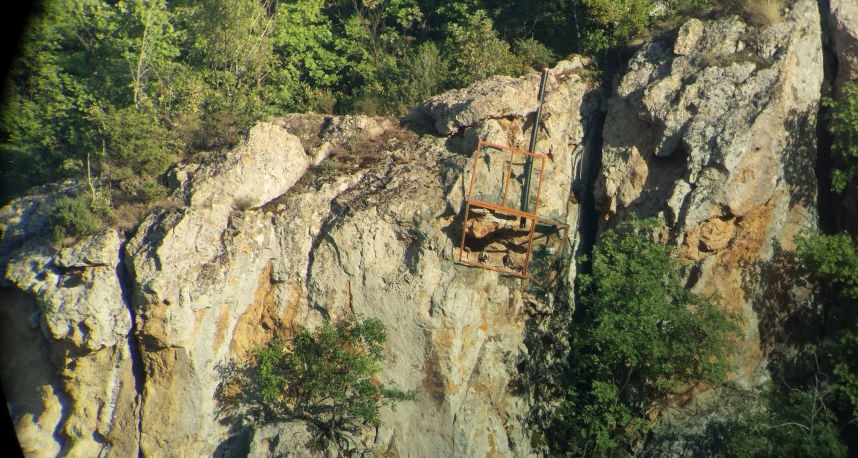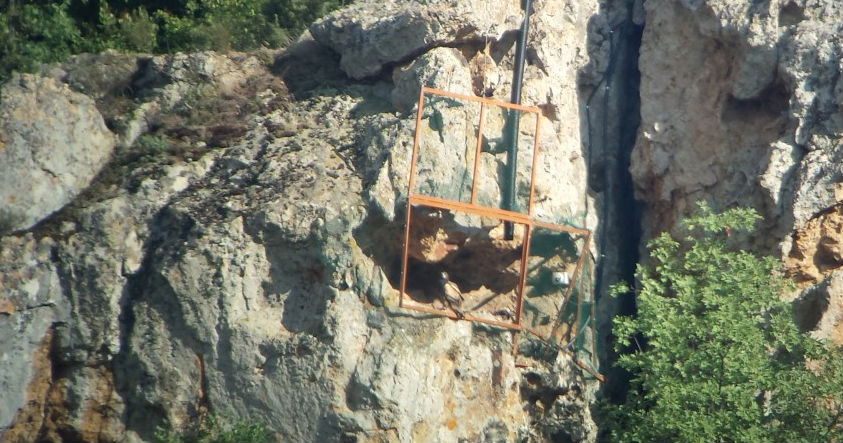Two more Egyptian vultures successfully released into the wild in Bulgaria in innovative experiment to test the techniques used to release these captive-bred migratory vultures.
Releasing Egyptian vultures into the wild
As part of the Egyptian Vulture New LIFE project, we at the Vulture Conservation Foundation are supporting and contributing to a comprehensive experiment that aims to test the different techniques of releasing captive-bred Egyptian vultures. This project will measure relative survival of birds released under three different technique to help the team understand the best technique for eventually restocking the small population of 60 pairs left on the Balkan peninsula.
The first of those, the delayed release technique, involves placing young chicks from one breeding season in an acclimitastion aviary at a release site and delaying their release into the wild until the following year. The second technique was fostering captive-bred chicks in wild nests which has had mixed results on the first attempt but a second attempt has been successful.
Hacking technique
The hacking technique involves placing chicks in an artificial enclosed surrogate nest where they will be fed (without any human contact) and looked after from a monitoring point in the distance until they fledge.
On Friday 10 August two young captive-bred Egyptian vultures from the Prague and Zlin Zoos that are Egyptian Vulture Captive Breeding Networked European Endangered Species Programme (EEP) were released into an site near Madzharovo in Bulgaria. The nest is built into the side of a rock face and offers the young birds a magnificent view of their new home in Bulgaria and was once home to a pair of Egyptian vultures.

Before the two young birds were placed in the hacking nest, they were fitted with GPS satellite transmitters that will help the Egyptian Vulture New LIFE team track their movements in Bulgaria ahead of their first migration to Africa later in the year. The two birds will stay in the site for the next 10-20 days before they fledge from the hacking nest and leave the release site.

Getting to know other birds
This technique allows the captive-bred birds to socialise with the other wild Egyptian Vultures. Near the hack site there is a feeding site where the young Egyptian vultures can easily find safe food. The Eastern Rhodopes are the core of the Egyptian vulture population in the Balkans and home to the largest population of the Griffon vultures in Bulgaria, which will also contribute to the quicker adaptation of the released birds.
UPDATED NEWS – Wednesday 22 August
The specially created nest in cliff side in Madzharovo, Bulgaria has been home to the two young birds for the last 10 days and have reached the age of fledging. To prepare the young birds the Egyptian Vulture New LIFE team have opened the doors to the enclosed adaptation aviary or hacking site.
In the last few days the birds have been vigorously exercising their flight muscles with excessive wing flapping and when the door was opened these curious young birds moved to view the landscape of their new home. It’s expected in the next couple of days they will take their first flights out of the aviary. The team will continue to feed the birds near the site and at nearby feeding stations until they leave the area.
The Egyptian Vulture New LIFE
The programme aims to reinforce the Egyptian vulture population in Europe’s easternmost range by delivering conservation measures that eliminate major known threats such as illegal poisoning and electrocution in their summer breeding grounds. In the whole of the Balkans there is just 60 pairs left in the whole of the region. The Egyptian Vulture New LIFE is a partnership of organisations, led by the Bulgarian Society for the Protection of Birds and Bulgarian conservation organisation Green Balkans,from 14 countries spanning Europe, the Middle East and Africa, to protect and conserve Egyptian vulture not only in Europe but all along their migratory flyway.





